Dental hygienists choose the career for a variety of reasons. Some of us liked the idea of studying a health care profession that would put us right into the workforce. Many of my colleagues viewed dental hygiene as an opportunity to balance professional and personal lives.
I just liked the idea of working with teeth, but I didn’t want to be responsible for administering anesthesia. However, local anesthesia administration by hygienists was approved in Pennsylvania shortly after I began my post-secondary education. This is a far cry from where I currently am in my career, overseeing students administering injections on a daily basis.
Regardless of why we enter dental hygiene, a shortage of hygienists persists, including those aiming to work in settings where direct patient care is provided.1
A Look into Hygienist’s DISC Personality Style and Happiness
As much as I enjoyed aspects of private practice, I yearned to be in education. Maybe it was the unyielding inter-office drama or the chronic back pain talking. Maybe it was the yearning to find something bigger with the promise of upward mobility, but I was ready for a change.
Many of my hygiene acquaintances had also been leaving their positions around this time. Some went to more administrative office roles with less physical demand. Others went strictly to temping to avoid being bound to an office with no flexibility. Quite a few left dentistry entirely. One colleague left to work as a full-time fitness and wellness coach. (Here’s a shout-out to Joyce for helping me discover my love of boxing!)
We’re all familiar with burnout, but what makes a hygienist want to leave clinical practice while others practice with vigor until retirement? As a self-proclaimed “tooth nerd” and psychology enthusiast, I wondered if personality style among dental hygienists may play a role in whether clinicians stay in positions where they provide direct patient care and satisfaction levels of their careers.2,3
My master’s thesis aimed to see if certain DISC personality types are more likely to remain in clinical dental hygiene and if possessing particular traits means these individuals are more likely to find fulfillment in their careers.4
DISC Assessment Overview
DISC assessments use various questions to assess personality, particularly in an employment setting where teamwork is considered central. Each letter represents a personality type, of which those individuals tend to possess certain qualities.5
D = dominance
I = influence
S = steadiness
C = conscientiousness
Behaviors associated with dominance (D) personalities include accepting challenges and actively working to achieve results. A D tends to be strong-willed.6 If we were comparing them to celebrities, think along the lines of some of some prominent politicians. Then again, being a D myself, I think Beyonce.
People with an influence (I) style personality are enthusiastic, will take action, and appreciate collaboration, as they tend to be talkative and like interacting with others.6 The queen of daytime television herself, Oprah Winfrey, is definitely high on the I scale.
Steadiness (S) personalities desire stability through support and collaboration.6 They tend to be gentle and accommodating to others like Taylor Swift or Malala Yousafazai.
Conscientiousness (C) personalities like challenges they can approach with accuracy and stability. Think along the lines of tech guru Bill Gates. C personalities are usually logical and analytical.6
DISC is viewed as a spectrum. Rarely does anyone possess all qualities of one type and none of another. The idea behind DISC assessments is that teams can identify and, in turn, utilize everyone’s strengths while communicating more effectively.6
Study Participants
Participation in the survey was limited to U.S. hygienists who currently hold or have previously held a dental hygiene license. An abridged 2019 DISC psychometric test was used to determine the strongest personality type of each respondent.7 Additional questions assessed overall participant satisfaction in various aspects of their dental hygiene careers.
In total, 1,280 eligible participants completed the survey. Of those, almost 99% held an active dental hygiene license. Over 84% of respondents said they primarily work in a clinical practice setting. Of the 1,280 participants, 71 (5.5%) claimed not to be working at the time of the survey.
Almost 3% work in a school or public health setting, and nearly 4% are in education. About 1.5% work outside of dentistry altogether, and 2% work in a dental setting outside of hygiene.4
Respondents varied from new grads to retirees, with most performing patient care daily to weekly in private practice. Responses were reported from all 50 U.S. states, with the highest number of responses coming from more densely populated areas, including California and Texas.4
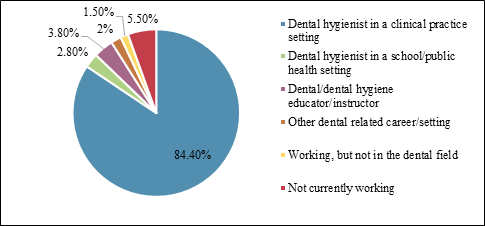
Study Results
Participants who were assessed as exhibiting a single, dominant personality style totaled 1,032. The remaining 248 were found to have an equal combination of multiple styles. Of the four personality profiles, D (dominant) personality types were the smallest group at 5%. I (influencing) personalities came in at 8%, and C (conscientious) respondents came in at 23% of respondents. The overwhelming majority, 64% (659 respondents), scored as S (steadiness) personalities.*
*Based on the relative frequency of question responses, a minimal difference exists between all respondent personality types (n=1,280) and those who were found to have a single, dominant personality style (n=1,032).
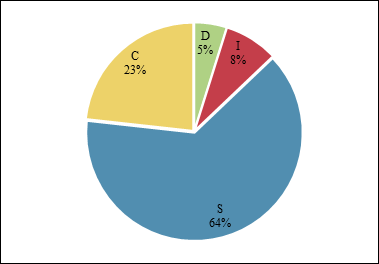
In regard to questions concerning vocational fulfillment, participants had five Likert-scale choices ranging from “very satisfied/likely” to “very dissatisfied/unlikely.” Results showed no statistical difference if the scale was interpreted as having five or three choices. Hence, the results of the options of “very likely” were combined with “likely,” and “very dissatisfied” was combined with “dissatisfied.”
Overall, satisfaction levels of each personality type showed that most respondents ‒ regardless of personality type ‒ were “satisfied” or “very satisfied” with most aspects of their dental hygiene careers.
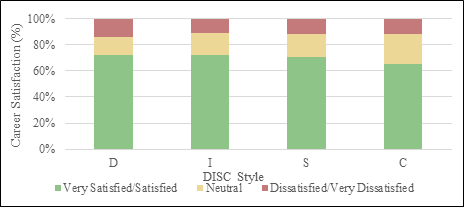
Concerning salary, most respondents said they are “satisfied” or “very satisfied” with their compensation as a hygienist. Salary was the only area where statistical significance related to personality type was found. Because of this significance, I personalities are more likely to be satisfied with their salaries, while D personalities are least likely to be satisfied.
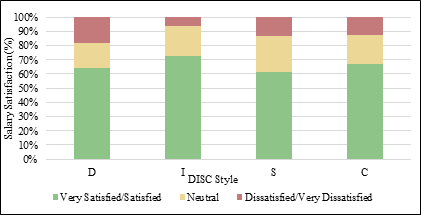
Participants were then asked, “If given the opportunity to choose a career/educational path again, how likely are you to choose dental hygiene?” The relative frequency of responses shows that more hygienists said they would choose hygiene again.
However, the margins begin to narrow for this question. Those with I personality types were most likely (55%) to choose dental hygiene again. In contrast, C personality types were least likely (41%) to choose dental hygiene again. D and S personality types yielded similar results, each around 50%.
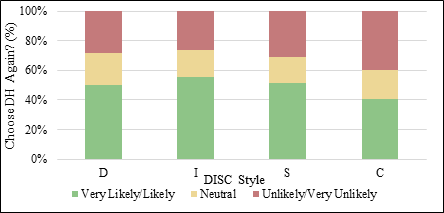
Finally, participants were asked, “How likely are you to leave clinical hygiene for reasons other than retirement?” Considering only responses from those currently in private practice, S personalities were found to be most likely to remain in the dental hygiene field, while I personalities were most likely to leave.
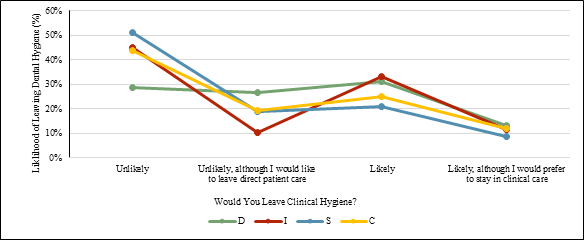
Results Summary
While the only area to show any significant statistical correlation was salary, the results can infer quite a few things about hygienists, such as their personalities and satisfaction levels.
Like much of the general population, most hygienists have an S personality type. These qualities make us more inclined to help others and strive to be consistent in how we perform our job functions.
Almost all respondents had something positive to say about their journey in dental hygiene. Even those who wouldn’t necessarily choose to do it again are happy overall in their career. All 50 U.S. states had a consistent mix of D, I, S, and C personality types, with 49 states showing that overall satisfaction significantly outweighed dissatisfaction.
New Jersey was the only state with more negative responses than positive based on percentage per state. This was followed by South Carolina and Oklahoma. Respondents from Kansas, Connecticut, Kentucky, and Oregon had the highest level of satisfaction, with over 50% stating that they were “very satisfied” with dental hygiene.
In Closing
While the day-to-day trials and tribulations of dentistry might make us crazy, overall, most of us enjoy what we do. Another observation is that we love our patients and want the best for them. Most participants reinforced this sentiment, and for many, it was why they have stayed or plan on staying right where they are.
There’s a place for all of us within the dental hygiene profession. It’s just a matter of finding our niche and learning to appreciate what everyone brings to the table.
Before you leave, check out the Today’s RDH self-study CE courses. All courses are peer-reviewed and non-sponsored to focus solely on high-quality education. Click here now.
Listen to the Today’s RDH Dental Hygiene Podcast Below:
References
- Vick, B. Career Satisfaction of Pennsylvanian Dentists and Dental Hygienists and Their Plans to Leave Direct Patient Care. Journal of Public Health Dentistry. 2016; 76(2): 113-121. https://doi.org/10.1111/jphd.12119
- Bollmann, G., Rouzinov, S., Berchtold, A., Rossier, J. Illustrating Instrumental Variable Regressions Using the Career Adaptability-Job Satisfaction Relationship. Frontiers in Psychology. 2019: 10: 1481. https://doi.org/10.3389/fpsyg.2019.01481
- Monson, A.L. Characteristics of Dental Hygienists Based on Holland’s Career Choice Theory. Journal of Dental Hygiene. 2012; 86(2): 141-149. https://jdh.adha.org/content/jdenthyg/86/2/141.full.pdf
- Gill, K. (2021). Exploring the Relationship Between Personality and Vocational Fulfillment Among Dental Hygienists: A National Survey. [Unpublished master’s thesis]. West Liberty University.
- History of DISC. (n.d.). Online DISC Profile. https://www.onlinediscprofile.com/what-is-disc/disc-history/
- How DiSC Works. (n.d.). Disc Profile. https://www.discprofile.com/what-is-disc/how-disc-works/
- DISC Assessment Test. (2019, April 30). Open-Source Psychometrics Project. https://openpsychometrics.org/tests/ODAT/










